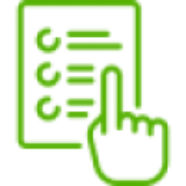Mortgage for the self-employed
We find mortgage solutions for all types of customers. Among our financial partners, we'll find a mortgage offer that's just right for you.
Whatever your financial history, the nature of your profession or business, your mode of remuneration - talk to us! You'll find an ally who's ready to listen, understand your specific situation and, above all, negotiate in your best interests to find you the best possible mortgage.
It is estimated that there are over 500,000 self-employed workers in Quebec (Source: https://statistique.quebec.ca/fr/communique/resultats-enquete-population-active-quebec-decembre-2022).
Challenges and difficulties faced by the self-employed
- Proof of variable income: Self-employed people often have fluctuating incomes, which can make it difficult to demonstrate financial stability to lenders.
- Complex documentation: Financial institutions may require more detailed documentation for the self-employed, such as bank statements, tax returns and employment contracts.
- Lack of pay stubs: Without regular pay stubs, it can be difficult to prove consistent, reliable income.
- Higher risk assessment: Lenders may consider self-employed people to be riskier borrowers due to the uncertainty surrounding their income.
- Higher downpayment requirements: Self-employed people may be required to make a higher downpayment than traditional wage earners to compensate for the risk perceived by lenders.
- More rigorous underwriting process: Lenders may apply stricter approval criteria and a more thorough assessment of self-employed people's financial history.
It's important to note that every situation is unique, and specific challenges may vary depending on factors such as length of practice, type of professional activity and overall financial stability. One of our mortgage brokers can help you navigate these challenges and find solutions tailored to your situation.
How to put together a mortgage application:
- Proof of income: Provide clear, detailed documentation to demonstrate your regular, stable income as a self-employed worker.
- Solid financial balance sheet: Present a solid financial balance sheet highlighting your ability to manage your finances responsibly and honor your financial commitments.
- Work history: Highlight your experience and professional stability as a self-employed worker to reassure lenders about the viability of your business.
- Debt and credit history: Maintain a low level of debt and a favorable credit rating, which can enhance your credibility with lenders.
- Downpayment: Save enough for an adequate downpayment, which may be higher for the self-employed.
- Explanation of fluctuating income : Prepare a clear and convincing explanation to explain income fluctuations and reassure lenders of your ability to cope with these fluctuations.
Can a self-employed person obtain a mortgage similar to that of an employee?
If a self-employed person can prove sufficient declared income over the last two years and meet the criteria and ratios of banks or insurers, they can obtain financing similar to that of an employee. Requirements include:
- Be self-employed for at least 2 years
- 2 years' proof of declared income
- Be up to date with tax payments (federal and provincial)
- Have a credit rating > 620
- Have a minimum down payment of 5% or 10%
Don't worry if you don't meet these criteria, our team is here to help.
FAQ - Self-employment and Mortgages in Canada
Q1: What are the specific requirements for self-employed people when applying for a mortgage?
A: Self-employed people are generally required to provide detailed proof of income, tax returns, bank statements and employment contracts.
Q2: How do lenders evaluate the income of self-employed people when approving a mortgage?
A: Lenders look at average income over a two-year period, and consider stability and regularity of income.
Q3: What documents are usually required to prove self-employed income?
A: Commonly required documents include tax returns, notices of assessment, bank statements, employment contracts, invoices and client statements.
Q4: Do self-employed people need a larger down payment to obtain a mortgage?
A: Self-employed people may be subject to higher down payment requirements, generally 10% to 20%, depending on their financial profile and the lending policies of the institutions.
Q5: How can fluctuations in self-employed income affect mortgage eligibility?
A: Income fluctuations can make it difficult to demonstrate financial stability, but proof of regular income and clear explanations can help overcome these challenges.
Q6: Are there specific mortgage programs or loan options for the self-employed?
A: Yes, some financial institutions offer mortgage programs specifically designed for the self-employed, taking into account their unique needs and financial situation.
Q7: How can I improve my chances of obtaining a mortgage as a self-employed person?
A: Prepare complete financial documents, maintain a good credit rating, save for an adequate downpayment and work with a specialized mortgage consultant to maximize your chances of success.
Q8: What are the specific advantages and challenges of obtaining a mortgage as a self-employed person?
A: Advantages include greater flexibility in managing your finances, while challenges can include the need to prove stable income and meet stricter documentation requirements.
Q9: Is it possible to deduct business expenses when calculating mortgage income?
A: Yes, certain business expenses can be deducted to reduce income.
















